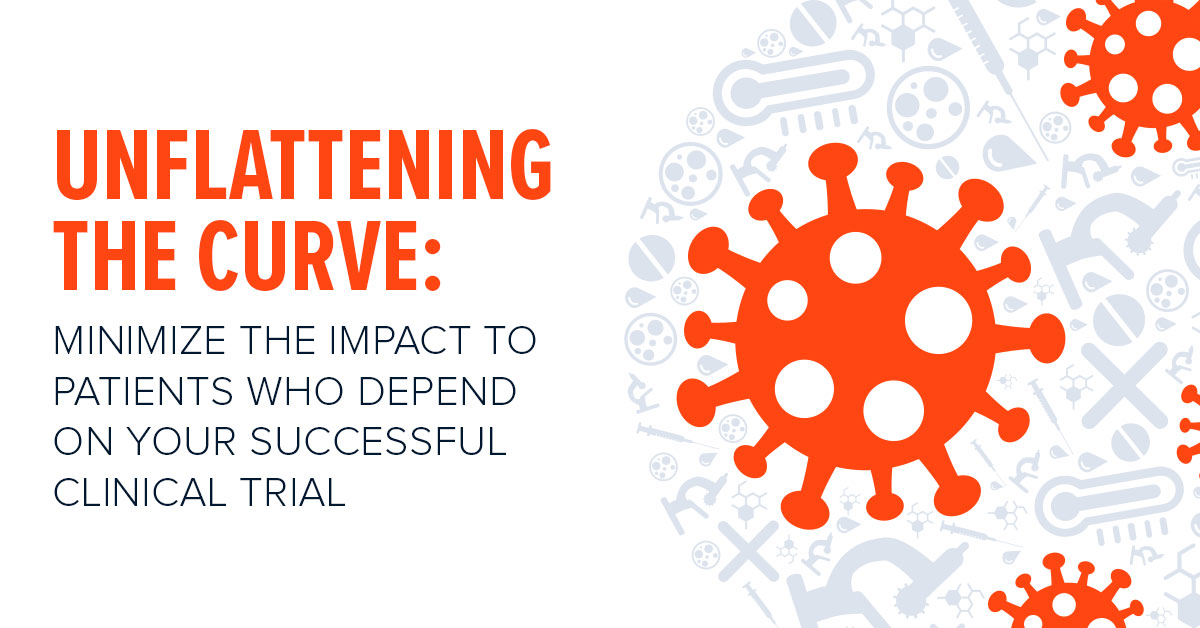In this time of uncertainty caused by the COVID-19 pandemic, the importance of delivering new treatments to patients as quickly as possible has never been more vital.
Just as how our response and immediate action to the “Flattening the Curve” movement will dramatically lessen the severity and impact of this pandemic on millions of lives, the actions and strategies we implement in our clinical studies today will impact how patients in current trials will get their investigational treatments. Without a proactive and comprehensive strategy in place to manage clinical trials over the coming weeks and likely months, consequences may be severe –especially for those that need the treatment the most.
While each study is unique, we have compiled three of the most critical considerations to manage your clinical trial in the wake of the Coronavirus – and any future pandemics to come. Proper early response strategies can significantly save time in your development process, get your treatment to market faster, and most importantly, ensure the patients in your trials have the greatest chance for continued access to your treatment.
It starts with the patient.
- Develop a patient outreach strategy to characterize the impact that COVID-19 will have on the trial stakeholders:
- Increase communications to patients. We are in uncharted territory, and social distancing and isolation can be extremely difficult with a greater effect on those that have special health conditions. Frequent updates to patients can reinforce retention and adherence to treatment.
- Include a checklist or questionnaire that collects key data such as safety of the patient, treatment compliance, impact on the continuation of on-site visits with the Principal Investigator (PI), and overall wellbeing.
- Perform a gap analysis of the protocol to understand areas that may pose difficulty under the current situations, such as patient visit attendance. Protocol deviations may be unavoidable, and it’s important to document them in a timely manner, show rationale and impact to patient safety and data integrity and, in certain situations, make necessary amendments to trial protocol.
Sites and PIs are on the frontline.
Assess potential challenges for clinical research sites and find ways to best support them during this time – it is paramount to the continued existence and viability of your study. Considerations include:
- Track site staff capacity and impact. Healthcare workers are our most valuable resource in the treatment of not only trial participants, but others affected by COVID-19.
- Understand the impact on a site’s resource capacity for their own business continuity plans due to equipment limitations, storage constraints, and other factors. There could be certain situations where you have the opportunity to deploy extra resources to the site or leverage outsourced study nurses or coordinator services to support clinical trial activities.
- Continue to keep the scheduled pre-study or interim monitoring visits, but consider a shift to remote visits. This strategy can include communication with the site via TC, the assignment of important tasks over the phone, and remote/central monitoring.
- Consider a fully decentralized model. Clinical sites are comprised of many different stakeholders, and situations may arise where there is a hold on recruitment activities or delays to the start of new studies until further assessment. While those situations may be warranted, there might be some avenues where a decentralized model could continue to keep some trial momentum. In these cases, it’s important to take into account the patient population and protocol design. For example, in cases of scheduled treatments that are critical for patients, such as in oncology or rare disease programs, it may be essential to keep the study on-track and leverage home nursing, telemedicine, and other components to lessen the logistical burden.
Keep key critical contributors top-of-mind.
- Reach out to all stakeholders such as central labs, imaging centers, and drug logistics suppliers, and review the potential impact to protocol requirements.
- Understand the impact to lab processing timelines and/or shipment courier timelines. Local labs may experience a backlog of processing requests or reduced capacity. Keep lines of communication open to address possible challenges and delays.
During the challenging weeks ahead, it becomes paramount to keep your end objective top of mind. Six or 12 months from now when you compile a submission to the FDA, think about the necessary documentation that will demonstrate proper oversight and control and maintain patient safety and data integrity during this critical phase. The FDA recently released a guidance document that will be helpful for clinical trial teams to reference.
We recommend that you consider a COVID-19 response strategy plan, schedule daily or weekly check-ins with partners, sites, and patients, and document key actions and decisions in real time in order to help tell the narrative of a proactive response during this critical time.
Are you interested in learning more about Biorasi’s experience in Clinical Trials design and development? Connect with us today.





